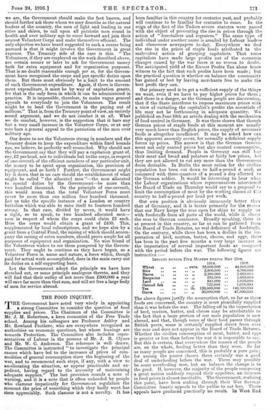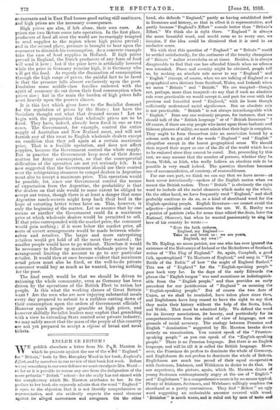THE FOOD INQUIRY.
THE Government have acted very wisely in appointing a strong Committee to consider the question of food supplies and prices. The Chairman of the Committee is Mr. J. M. Robertson, a keen economist of the Free Trade school. Among his colleagues are Professor Ashley and Mr. Rowland Prothero, who are everywhere recognized as authorities on economic questions, but whose leanings are towards Protection. The Committee also includes repre- sentatives of Labour, in the persons of Mr. J. R. Glynes and Mr. W. C. Anderson. The reference is well drawn. The Committee is instructed "to investigate the principal causes which have led to the increases of prices of com- modities of general consumption since the beginning of the war, and to recommend such steps, if any, with a view to ameliorating the situation, as appear practicable and ex- pedient, having regard to .the necessity of maintaining adequate supplies." The last provision sounds a note of warning, and it in a note that is often unheeded by people who clamour impatiently for Government regulation the moment the price of something which they badly want has risen appreciably. Such clamour is not a novelty. It has been familiar in this country for centuries past, and probably will continue to be familiar for centuries to come. In the reign of the first of the Tudors severe statutes were passed with the object of preventing the rise in prices through the action of "forestallers and regraters." The same type of individual under another name is assailed by Labour leaders and clamorous newspapers to-day. Everywhere we find the rise in the prices of staple foods attributed to the malevolent action of grasping capitalists. That some capitalists have made large profits out of the economic changes caused by the war there is no reason to doubt. The anticipated yield of the Excess Profits Tax alone bears witness to the fact that such profits have been made ; but the practical question is whether on balance the community has gained or lost by leaving merchants free to make the best profit they can.
Our primary need is to get a sufficient supply of the things we want, even if we have to pay higher prices for them ; and there is a danger, as the German people are discovering, that if the State interferes to impose maximum prices with a view of curtailing the capitalist's profits the essentials of life may not be forthcoming in adequate quantity. We published on June 10th an article dealing with the mechanism of food control in Germany. It was there shown that though German prices of staple foods at this moment are usually very much lower than English prices, the supply of necessary foods is altogether insufficient. It may be asked how can this apparent anomaly occur, for normally a deficient supply forces up prices. The answer is that the German Govern- ment not only control prices but also control consumption, thus limiting demand. People in Germany can still buy their meat and bread and potatoes at fairly low prices, but they are not allowed to eat any more than the Government deem desirable. In Berlin the meat ration for the civilian population has been cut down to half-a-pound a week, as compared with three-quarters of a pound a day allotted to the German soldier. It would be interesting to hear what the Labour organizations whose representatives interviewed the Board of Trade on Thursday would say to a proposal to limit the consumption of meat by the working classes of Cis country to half-a-pound per head per week.
Our own position is obviously immensely better than that of Germany, and it is better primarily for the relsou that our Navy keeps the seas open for ships to supply, us with foodstuffs from all parts of the world, while it closes the seas to German commerce. Broadly speaking, there is at present in this country, so far as can be gathered • front the Board of Trade Returns, no real deficiency of foodstuffs. On the contrary, while there has been a decline in the im- portation of beef, mutton, butter, cheese, and eggs, there has been in the past five months a very large increase in the importation of several important foods as compared with the period before the war. The following figures are instructive :— IMPORTS DVREc0- Five MONTHS ENDING MAY MST.
The above figures justify the assumption that, so far as these foods are concerned, the country is more plentifully supplied than it was before the war. The falling off in the importation of beef, mutton, butter, and cheese may be attributable to the fact that a large portion of our male population is now abroad, and that, though some of their food passes through British ports, some is certainly supplied direct from over the seas and does not appear in the Board of Trade Returns. Whether the civilian consumption of meat, butter, and eggs is greater or less than before the war it is impossible to say. But this is certain, that everywhere the masses of the people are, on the whole, feeding better than they were. So far as many people are concerned, this is probably a pure gain ; for among the poorer classes there certainly was a good deal of underfeeding before the war. There may possibly be some overfeeding now, but on balance the change is te the good. If, however, the majority of the people composing a great nation suddenly expand their appetites, an increase in food prices is almost inevitable. The Government, realizing this point, have been making through their War Savings Committee frantic appeals to the public to eat less. Those appeals have produced practically no result. In West End
Wheat — Rice Bacon — arine Canned fish Tea Cocoa .. 1914.
▪ awts. 38,000.000 • „ 2,800,000 „ 2,200.000
IWO •.• pp 838,000 ▪ • • PP 841,000 722,000
▪ .. lb. 130,000,000
• • 30,000,000
1910. 44,000,000 4,700,000 3,800,003 1,083,000 1,018,000 1,078,003 140,700,000 47,600,000
• • • • • • • • • • • •
restaurants and in East End homes good eating still continues, and high prices are the necessary consequence.
High prices are also, if left alone, their own cure. As prices rise two Actors come into operation. In the first place, producers of food all over the world are increasingly tempted to send supplies to the region where high prices prevail ; and in the second place, pressure is brought to bear upon the consumer to diminish his consumption. As a concrete example take the case of food supplies in Holland. If high prices prevail in England, the Dutch producers of any form of food will send it here ; but if the price here is artificially lowered while the price in Germany remains high, it is Germany who will get the food. As regards the diminution of consumption through the high range of prices, the painful fact to be faced is that the pressure falls almost exclusively upon the poor. Doubtless some middle-class families endowed with the spirit of economy do cut down their food consumption when prices rise ; but in the main the burden of high prices falls most heavily upon the poorest classes.
It is this fact which gives force to the Socialist demand for the regulation of prices by the State ; but have the Socialists thought out what that demand means ? Let us begin with the proposition that wholesale prices are to be fixed. They have, indeed, already been fixed in one or two cases. The Government, for example, control the entire supply of Australian and New Zealand meat, and will not furnish any of this meat to English wholesale dealers except on condition that they sell again at a certain maximum price. That is a feasible operation, and does not affect supplies, because the Government control the whole supply. But in practice the Government keep most of their Anzac mutton for Army consumption, so that the consequential difficulties of the operation are not yet seriously felt. It is now suggested that the Government should use their control over the refrigerating steamers to compel dealers in Argentine meat also to accept a maximum price. This operation would be possible, for, since our Government control the means of exportation from the Argentine, the probability is that the dealers on that side would to some extent be obliged to accept our terms, though there is at least a danger that some Argentine ranch-owners might keep back their beef in the hope of extorting better terms later on. This, however, is only the beginning of the matter. Let us assume that by one means or another the Government could fix a maximum price at which wholesale dealers would be permitted to sell. If that price corresponded with the market price, the consumer would gain nothing ; if it were below the market price, all sorts of covert arrangements would be made between whole- salers and retailers. The larger and more enterprising retailers would get hold of all the meat they wanted ; the smaller people would have to go without. Therefore it would be necessary to follow up maximum wholesale prices by an arrangement limiting the amount to go to any particular retailer. It would then at once become evident that maximum retail prices must also be fixed, or the well-to-do private consumer would buy as much as he wanted, leaving nothing for the poor.
The final result would be that we should be driven to rationing the whole community, even as Germany has been driven by the operations of the British Fleet to ration her people. Is this what the working classes of Great Britain want ? Are the men who are now enjoying substantial meals every day prepared to submit to a ruthless cutting down of their consumption upon the orders of Government officials ? However Tuch people may grumble at high prices, and however skilfully Socialist leaders may exploit that grumbling with a view to extending State control over private industry, we may safely assert that the mass of the people of this country are not yet prepared to accept a regime of bread and meat tickets.



































 Previous page
Previous page